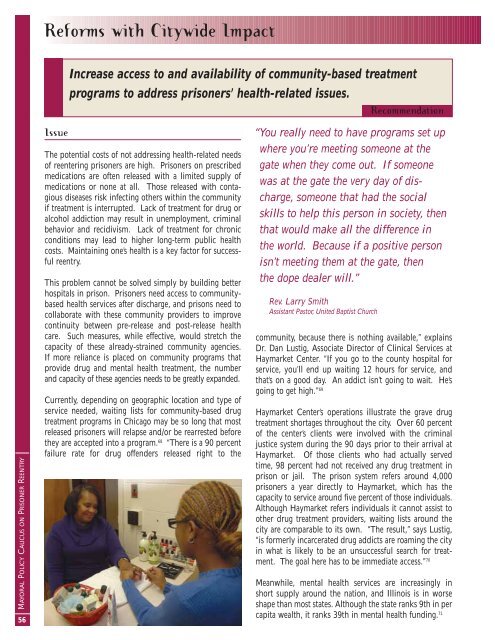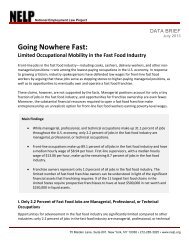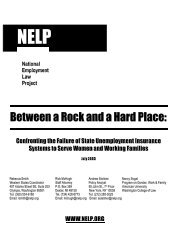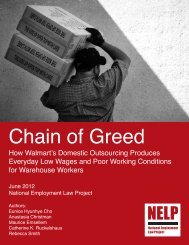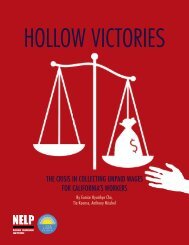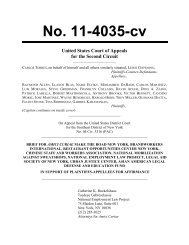Rebuilding Lives. Strengthening Communities.
Rebuilding Lives. Strengthening Communities.
Rebuilding Lives. Strengthening Communities.
Create successful ePaper yourself
Turn your PDF publications into a flip-book with our unique Google optimized e-Paper software.
Reforms with Citywide Impact<br />
Increase access to and availability of community-based treatment<br />
programs to address prisoners’ health-related issues.<br />
Recommendation<br />
MAYORAL POLICY CAUCUS ON PRISONER REENTRY<br />
56<br />
Issue<br />
The potential costs of not addressing health-related needs<br />
of reentering prisoners are high. Prisoners on prescribed<br />
medications are often released with a limited supply of<br />
medications or none at all. Those released with contagious<br />
diseases risk infecting others within the community<br />
if treatment is interrupted. Lack of treatment for drug or<br />
alcohol addiction may result in unemployment, criminal<br />
behavior and recidivism. Lack of treatment for chronic<br />
conditions may lead to higher long-term public health<br />
costs. Maintaining one’s health is a key factor for successful<br />
reentry.<br />
This problem cannot be solved simply by building better<br />
hospitals in prison. Prisoners need access to communitybased<br />
health services after discharge, and prisons need to<br />
collaborate with these community providers to improve<br />
continuity between pre-release and post-release health<br />
care. Such measures, while effective, would stretch the<br />
capacity of these already-strained community agencies.<br />
If more reliance is placed on community programs that<br />
provide drug and mental health treatment, the number<br />
and capacity of these agencies needs to be greatly expanded.<br />
Currently, depending on geographic location and type of<br />
service needed, waiting lists for community-based drug<br />
treatment programs in Chicago may be so long that most<br />
released prisoners will relapse and/or be rearrested before<br />
they are accepted into a program. 68 “There is a 90 percent<br />
failure rate for drug offenders released right to the<br />
“You really need to have programs set up<br />
where you’re meeting someone at the<br />
gate when they come out. If someone<br />
was at the gate the very day of discharge,<br />
someone that had the social<br />
skills to help this person in society, then<br />
that would make all the difference in<br />
the world. Because if a positive person<br />
isn’t meeting them at the gate, then<br />
the dope dealer will.”<br />
Rev. Larry Smith<br />
Assistant Pastor, United Baptist Church<br />
community, because there is nothing available,” explains<br />
Dr. Dan Lustig, Associate Director of Clinical Services at<br />
Haymarket Center. “If you go to the county hospital for<br />
service, you’ll end up waiting 12 hours for service, and<br />
that’s on a good day. An addict isn’t going to wait. He’s<br />
going to get high.” 69<br />
Haymarket Center’s operations illustrate the grave drug<br />
treatment shortages throughout the city. Over 60 percent<br />
of the center’s clients were involved with the criminal<br />
justice system during the 90 days prior to their arrival at<br />
Haymarket. Of those clients who had actually served<br />
time, 98 percent had not received any drug treatment in<br />
prison or jail. The prison system refers around 4,000<br />
prisoners a year directly to Haymarket, which has the<br />
capacity to service around five percent of those individuals.<br />
Although Haymarket refers individuals it cannot assist to<br />
other drug treatment providers, waiting lists around the<br />
city are comparable to its own. “The result,” says Lustig,<br />
“is formerly incarcerated drug addicts are roaming the city<br />
in what is likely to be an unsuccessful search for treatment.<br />
The goal here has to be immediate access.” 70<br />
Meanwhile, mental health services are increasingly in<br />
short supply around the nation, and Illinois is in worse<br />
shape than most states. Although the state ranks 9th in per<br />
capita wealth, it ranks 39th in mental health funding. 71


